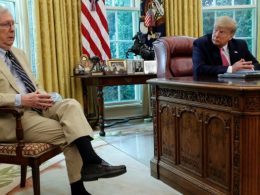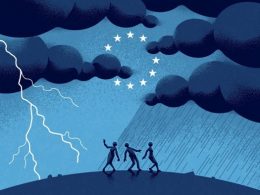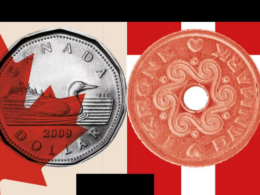The EU will propose retaliation for US so-called “reciprocal” tariffs early next week, the European Commission said on Tuesday as it struggles to respond quickly to the trade war begun by President Donald Trump.
Trade spokesperson Olof Gill said the Commission would present its retaliation plan to member states, although it would still prefer to negotiate with the US if possible.
“Our door is open and we are ready to talk,” he said, while admitting that “things are not getting better, they are getting worse”.
Trump has placed sectoral tariffs on EU steel, aluminium and cars, and a 20 per cent “reciprocal rate” on almost everything else.
So far Brussels has only responded to the metals tariffs, and its original list of countermeasures for those has been watered down after lobbying by member states.
The original €26bn of US goods due to be hit by the countermeasures, which matched the quantity of European goods affected by US tariffs, has been reduced to €21bn, said two officials.
Products such as bourbon, wine and dairy products have been removed thanks to requests from Italy, France and Ireland, according to a leaked proposal on which member states will vote on Wednesday.
Those countries had feared the impact of any potential further retaliatory tariffs from the US on their own food and drinks products. Trump had threatened a 200 per cent levy on European alcohol if bourbon was hit.
Still, US goods including soyabeans, chicken and motorbikes will be affected by the EU’s retaliatory measures, which will take effect between April and December 1.
Talks with the US so far have been fruitless, according to officials in Brussels. Commission president Ursula von der Leyen said on Monday that the US had not engaged with its offer to agree to eliminate all tariffs from both sides on industrial goods, particularly cars.
She said “we keep it on the table”.
Gill said, however, that the EU was not prepared to discuss many of the complaints outlined by Trump’s trade adviser Peter Navarro, who wants trading partners of the US to modify policies in areas that extend far beyond tariffs.
Navarro has repeatedly criticised value added tax, but Gill denied that this amounted to a non-tariff barrier to trade. The US adviser has also attacked “discriminatory product standards” but Gill said Brussels would not compromise its health and safety standards, which, for example, ban many imports of genetically modified food.
EU trade commissioner Maroš Šefčovič told member states on Monday that he speaks to commerce secretary Howard Lutnick, but Lutnick has little authority, said two people briefed on the situation.
Rather, Šefčovič said that Lutnick could not make decisions without consulting Trump.

Benjamin Dousa, Sweden’s trade minister, said his country favoured a negotiated settlement. “But the signals we have got from the Commission is that our counterpart hasn’t been open for serious negotiations so far,” he added.
“Europeans don’t want a trade war. We don’t want trade disputes, especially not with one of our closest friends like the US . . . We didn’t choose this. We want more trade,” he said after an EU trade ministers’ meeting in Luxembourg on Monday.
But he added: “It was quite clear also that there is EU unity, that if we are forced to go forward with countermeasures, member states will support it.”
Divisions remain about the next steps, however. France, Germany and Spain are pushing for a strong and rapid retaliatory response but Italy, Greece, Romania and Hungary oppose escalation.
The former want the Commission, which has broad powers over trade policy, to threaten to use its so-called “bazooka”, the anti-coercion instrument, to hit US tech firms and other services suppliers.
Since the US has imposed tariffs on about €373bn of EU goods, officials said it was hard to hit back in kind without damaging the bloc’s own industries, which rely on some US imports.
They said they hoped that havoc wreaked by the tariffs on the US stock market and economy could convince Trump to backtrack. “It’s a huge self-inflicted wound. The longer we wait, the more pressure will build on him to change course,” one of the officials said.
Additional reporting by Laura Dubois in Brussels
Source link









